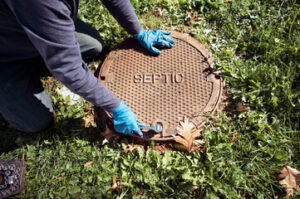When wastewater enters your septic system, natural bacteria in the tank break down solid waste. But excess water or inappropriate items flushed down drains can disrupt this bacterial balance, leading to clogged drain lines and system failure.
Identifying and addressing warning signs like sluggish drains, sewage odors, or wet spots in the yard helps avoid costly repairs or system failure. Learn how different seasons affect Septic Tank Armadale and simple ways to maintain healthy performance year-round.

Winter
The colder months can be hard on septic systems, especially in northern regions. Frozen septic tanks and pipes can cause blockages that disrupt normal bacterial waste breakdown processes. Proper maintenance and preventive steps help keep your system working well throughout the winter.
Small leaks in faucets, toilets, and other fixtures can impact your septic system during cold weather, as even slow trickles of water can freeze and put stress on the pipes. Repair these leaks to avoid problems in the future. Consistent water flow also reduces freezing risk. Avoid doing multiple loads of laundry in one day and install water-saving showerheads to minimize wastewater usage.
A clean septic filter helps prevent clogs and promotes efficient draining. Inspect and clean your septic tank filter periodically throughout the year to ensure it is operating properly.
Make sure the septic tank and drain field are adequately insulated. A layer of mulch, straw, or hay provides natural insulation that can help protect the septic system from freezing temperatures. Be careful not to drive vehicles or park heavy equipment over the drain field, as this can compact the soil and restrict proper drainage.
Call a professional if you see signs of frozen or blocked pipes, such as wastewater backups into the house. A plumber with specialized equipment can safely thaw septic systems without damaging the tank or pipes.
Spring
While most homeowners think that as long as the water “goes away,” it’s not doing much harm, septic systems require routine inspection and pumping to work properly. Without these essential steps, your system can quickly become overwhelmed and cause sewage backups or contaminate nearby water sources.
As spring arrives, it’s a great time to check your system for signs of failure, including septic tank leaks, sewage odors, high levels of nitrates or coliform bacteria in well water tests, and slow draining. Keeping up with these preventative maintenance activities in the spring can keep your septic system running smoothly all year round.
Be sure to clear any debris or weeds from the septic tank area, especially around the drain field. Keep vehicles, sheds, and equipment off the septic system to avoid soil compaction and damage. Also, minimize chemical fertilizer usage near the septic tank and drain field to protect the natural bacterial balance of the soil.
Mindful water usage helps ease stress on your septic system, too. Fixing leaky faucets, using low-flow showerheads and toilets, and spreading out laundry loads throughout the week are all simple steps that help your system stay in peak working condition.
Summer
A septic system is crucial to your home’s wastewater management. Failing septic systems can lead to groundwater contamination with untreated sewage, posing health risks for humans and pets. Investing in routine maintenance can protect your septic tank and drain field. It also prevents costly repairs, lowers property value, and reduces legal liabilities.
Hot summer temperatures and excessive rainfall can cause septic systems to strain and overflow, leading to costly problems down the road. Symptoms of overflow can include sewage surfacing in the yard or a ditch, smelly odors inside the house, high nitrate and coliform bacteria levels in well water tests, and soggy or muddy lawns.
Increased water usage during summer due to gardening, sprinkler systems, and filling pools adds extra pressure to your septic system. Staggering these activities and utilizing rain barrels to irrigate your lawn can help alleviate stress on your septic system. Installing low-flow fixtures, like toilets and showerheads, can further decrease water usage without a huge lifestyle change.
Hosting parties in the summer can also stress your septic system. It’s important to have your septic system inspected before inviting large groups of people over, so it can handle the additional waste that will be flushed down the toilets. Having your septic tank pumped regularly can also help reduce the amount of solids that accumulate in the drain field and cause clogs.
Fall
As the weather turns to cooler temperatures, many home systems require special attention. Among them is the septic system, which is vulnerable to cold-weather problems if not properly maintained.
Fall is also a good time to do any needed yard cleanup, especially around the septic tank and drain field. Make sure the area is clear of debris, such as fallen leaves or branches, which could clog pipes. Installing drainage solutions to direct water away from the septic tank and drain field can help prevent soil oversaturation that leads to wastewater backups.
It’s also a good idea to avoid using septic tank additives, which are often touted as a way to reduce or even eliminate the need for routine pumping. However, they can be harmful to the septic system.
During the summer, it is common for families to use more water than usual because of outdoor activities like gardening and filling the pool. Be careful with water usage and consider installing low-flow toilets and faucets. Be sure to spread out laundry loads and take shorter showers, and don’t use your garbage disposal excessively. Finally, be sure to keep heavy vehicles and equipment away from the septic tank and drain fields, as their weight can cause damage. For more information on maintaining your septic system, check out this artful and informative tabloid. You can find additional tips for septic system maintenance through local departments of health or environmental agencies.